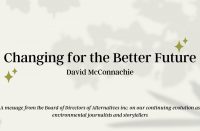If economic growth is an unmixed blessing, why would there be a need to talk about inclusive, green, clean, smart, responsible, or sustainable growth?
In my research, I’ve asked the question: can we in Canada have full employment, no poverty, greatly reduced greenhouse gas emissions, and fiscal balance without relying on economic growth? Sounds nice, doesn’t it?
If economic growth is an unmixed blessing, why would there be a need to talk about inclusive, green, clean, smart, responsible, or sustainable growth?
In my research, I’ve asked the question: can we in Canada have full employment, no poverty, greatly reduced greenhouse gas emissions, and fiscal balance without relying on economic growth? Sounds nice, doesn’t it?
I first addressed the implications of managing without growth 10 years ago in a book called Managing Without Growth: Slower by Design, not Disaster. I deliberately focused on rich countries where it has been shown in many studies that further increases in average GDP (gross domestic product) per person contribute less and less to people’s sense of well-being.
I used a simulation model of the Canadian economy to generate scenarios indicating that it is possible to move the economy towards prosperity and well-being without increasing GDP. I also considered some of the changes that would be necessary to make it so. These included a modest reduction in average annual working hours to reduce unemployment, an escalating carbon tax to discourage greenhouse gas emissions, and a number of anti-poverty measures to reduce poverty. Ultimately, I found that it would be possible for Canada to manage just fine without growth.
That was 10 years ago. Back then, it looked possible to make a reasonably smooth transition to an economy that would provide high and improving levels of well-being to all Canadians. Now it’s not so clear.
In the decade since I began my investigations into alternative economic futures, Canada’s GDP has grown 19.7 percent, GHG emissions have declined a measly 0.8 percent excluding LULUCF (land use, land-use change and forestry) but increased 6.0 percent including LULUCF. Although the inequality of income distribution declined slightly as measured by the Gini coefficient, the number of Canadians living below the Low Income Measure (LIM), used by the Organisation for Economic Co-operation and Development (OECD) to compare poverty among member countries, increased 8.0 percent. This was a smaller percentage increase than the total Canadian population, but nevertheless it meant that from 2004 to 2014 the number of Canadians with low incomes grew by 335,000 to 4.5 million.
It’s widely believed that economic growth – the continual expansion of production and consumption of finished goods and services – is absolutely essential for improving the well-being of Canadians. But GDP is a seriously inadequate measure of well-being.It says nothing about distribution, excludes many factors that influence well-being such as environmental damage and other social costs, gives no value to unpaid work, and includes some expenditures on items such as increased commuting and home alarms whose contribution to well-being is questionable.
While GDP has been growing, other measures designed to evaluate how Canadians are really doing tell a very different story about our well-being. For example, between 1994 and 2014 the Canadian Index of Well-being, which is based on changes in education, health, community vitality, democratic engagement, living standards, time use, environment, and leisure and culture, increased just 9.9 percent. Meanwhile GDP increased 38 percent.
The Slowdown of growth
Since the 1950s, the promotion of economic growth, measured as an increase in inflation-adjusted GDP, has been the overarching policy objective of virtually all governments and political parties. Now economic growth is proving increasingly elusive as growth rates continue to slow. The average annual growth rate of OECD economies combined fluctuated between four to six percent per year in the 1960s. Since 2001, it’s been in the 2 to 2.5 percent range with negative growth in 2009 during the financial crisis. The Canadian record is much the same. This decline in the rate of economic growth has revived concern about “secular stagnation,” a condition of ongoing low or no economic growth due to insufficient spending or slow increases in productivity or both.
Slowing growth is a matter of grave concern to those who regard economic growth as vital. But something else is wrong with economic growth. We can see this from the proliferation of adjectives that are now frequently placed in front of economic growth. If economic growth is an unmixed blessing, why would there be a need to talk about “inclusive” growth, “green” growth, “clean” growth, “smart” growth, “responsible” growth, “sustainable” growth, all terms easily found in the literature and on the Internet? It implies that, economic growth is exclusive, brown, dirty, stupid, irresponsible and unsustainable, and if it is slowing down anyway, we really ought to think about managing without growth altogether, at least in a rich country like Canada.
Whether for reasons of the decline in the growth rate or because of its increasingly obvious inadequacies as an indicator of improving well-being, it is becoming clear to ecological economists that increasing GDP should be seen for what it is: a measure of means, not ends. These ends include the promotion of well-being, employment, social justice, environmental quality, and biodiversity – themes you see throughout ecological economic discussions. If the pursuit of economic growth becomes an obstacle to the achievement of these ends, then it is growth that should be questioned, not the ends that it is intended to serve.
This is not to say that our new policy objective should be to replace positive growth in GDP with a rate of zero. Rather, it means that we should enhance what really matters as we thoughtfully and deliberately reduce the requirements for materials and energy in our economy and also reverse the destruction of habitat that is stressing so many species with which we share the planet.
In this context the question of whether we can manage without economic growth in Canada becomes important, because it is folly to celebrate small reductions in material and energy use per unit of GDP, if overall the economy continues to unsustainably strip the planet of resources. But, if GDP is not growing, then a reduction of materials and energy per dollar guarantees an overall reduction in resource use.
What happens if GDP doesn’t grow?
Suggestions to wean ourselves off dependence on economic growth are met with questions like “how can high levels of employment be maintained?” or “will it exacerbate inequality?” or “how will interest on loans be paid if GDP is not growing?” My colleagues and I have conducted in-depth research to answer these questions.
For example, my fellow economist Tim Jackson and I found that a two-fold strategy of work-time reduction and a shift to services with a low carbon footprint could maintain full employment in the UK with zero or even negative economic growth. We also found that inequality in a no-growth economy can be reduced with the increased prominence of sectors like health care, as well as stronger unions and labour protections. As well, through a relatively new type of macro-economic modelling we showed that a constant amount of money created through loans is perfectly consistent with a non-growing economy as long as bank profits obtained from extending the loans are distributed as dividends.
While GDP has been growing, other measures designed to evaluate how Canadians are really doing tell a very different story about our well-being”
Is growth our best future?
Steps are being taken in the public and private sectors to address some of the failures of economic growth but with limited results. The call for faster economic growth remains as loud as ever and as long as we allow economic growth to trump other more meaningful objectives, our future prospects will be bleak. Many groups and individuals are exploring possible alternatives that offer solutions to the multiple challenges of climate change, biodiversity loss, resource scarcity, social justice and financial instability.
Tim Jackson and I offered our own views of such a future in a report for the Next System Project, a multidisciplinary initiative with the aim of offering a new way forward for economic organization in the United States.
We focused our attention on five interrelated dimensions of an economy that would deliver shared prosperity within the ecological conditions of the Earth. We looked at the types of enterprises that could thrive independently of the need to grow, the kinds of employment they could offer, the level and mix of investment required to transform the economy over time, the financial systems required to support the transformation, and the governance structures to establish, maintain, and strengthen real democracy.
What has emerged is something we call “ecological macroeconomics.” This new approach to the macro-economy has three main components:
1. the “real economy” where goods and services are produced, distributed, and used,
2. a financial system that supports the real economy rather than dominates it, and
3. recognition that the materials and energy used to produce products (called “throughput”) link economies to the biosphere on which they are wholly dependent.
Such a conception of what economies are and how they function is essential for identifying opportunities for changing the direction in which the world’s economies, including Canada’s, are headed.
Mainstream macroeconomics is blind to many of the problems of our era. It does not account for any loss of capacity of the environment to provide resources, the implications of climate change, or the need to obtain resources from increasingly remote areas. It pays insufficient attention to the financial sector, and focuses heavily on growing GDP. If we continue to rely on traditional macroeconomics, we are doomed to repeat our mistakes. A new ecological macroeconomics can help us escape the limitations and failures of the current economic system.
Economists and those concerned with the environment must demonstrate that by pursuing growth when it has become uneconomic – when its benefits outweigh its costs – we will fail to achieve our real objectives. The way to do this is to show as best we can that Canada, like any advanced economy, can manage without economic growth. Then we can hope that growth as an overarching objective of economic policy will fade into the past where it belongs.
Ecological economist Peter A. Victor is a professor in Environmental Studies at York University. He has worked for nearly 50 years in Canada and abroad on economy and environment as an academic, consultant and public servant.












